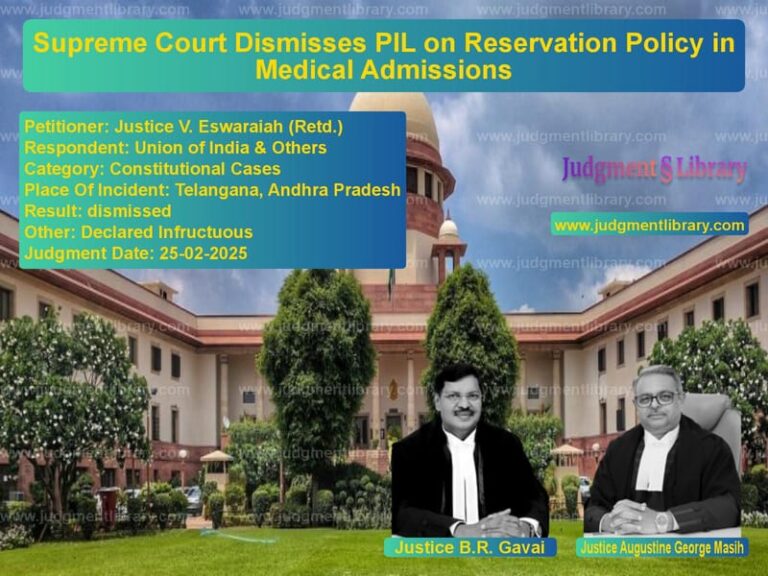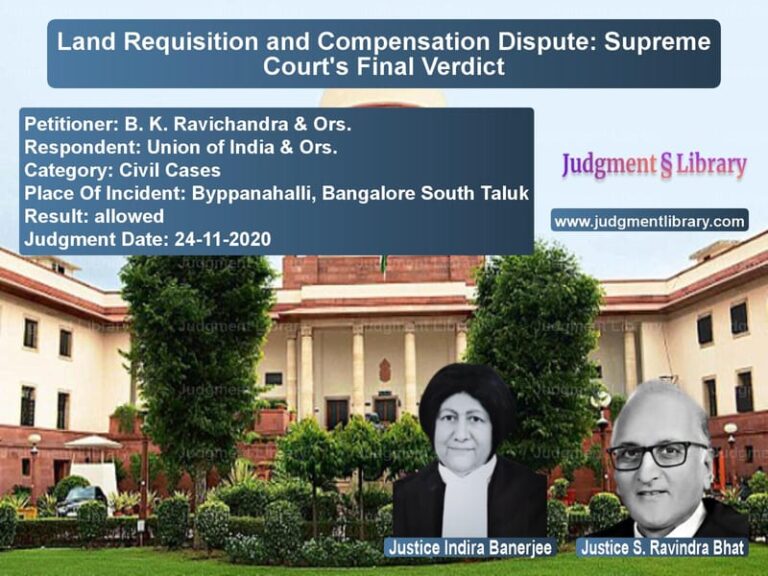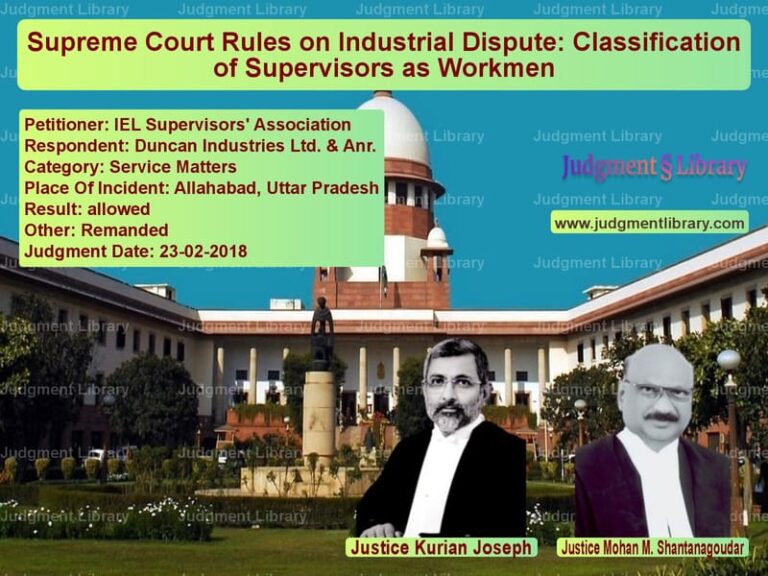Supreme Court Allows Termination of 14-Year-Old’s Pregnancy in Landmark Reproductive Rights Judgment
The case of A (Mother of X) vs. State of Maharashtra & Anr. revolves around a 14-year-old girl (‘X’) who was a victim of sexual assault and sought termination of her pregnancy beyond the legally permissible period of 24 weeks. The Supreme Court was called upon to decide whether the pregnancy could be terminated considering the physical and mental well-being of the minor.
Background of the Case
The minor girl, ‘X,’ was sexually assaulted in September 2023. However, due to her irregular menstrual cycles, she did not realize she was pregnant until March 2024, by which time the pregnancy had progressed to 25 weeks. Following this revelation, an FIR was registered under Section 376 of the Indian Penal Code (IPC) and Sections 4, 8, and 12 of the Protection of Children from Sexual Offences (POCSO) Act, 2012. Subsequently, the minor was taken to a hospital for medical examination.
A medical board at Grant Government Medical College & Sir JJ Group of Hospitals, Mumbai, initially found that ‘X’ was physically and mentally fit for termination, subject to the High Court’s permission. However, a subsequent medical report on April 3, 2024, without re-examining ‘X,’ stated that termination could not be allowed because the pregnancy had exceeded 24 weeks and the fetus had no congenital abnormalities.
On April 4, 2024, the Bombay High Court dismissed the mother’s writ petition, stating that the pregnancy exceeded the legally permissible period.
The mother then moved the Supreme Court under Article 136 of the Constitution.
Arguments by the Petitioner (Mother of X)
- The pregnancy resulted from sexual assault, causing immense trauma to the minor.
- Continuation of the pregnancy would severely impact the physical and mental health of ‘X.’
- The High Court ignored the minor’s well-being and focused only on legal gestational limits.
- The minor was unaware of her pregnancy due to irregular periods, and the delay was not intentional.
- The Medical Termination of Pregnancy (MTP) Act, 1971 must be interpreted in favor of the rights of the victim.
Arguments by the Respondents (State of Maharashtra)
- The MTP Act does not permit termination beyond 24 weeks unless the fetus has substantial abnormalities.
- The safety of the minor was paramount, and a late-stage abortion could pose risks.
- The High Court correctly applied the law in rejecting the plea.
Supreme Court’s Interim Relief and Medical Board Examination
On April 19, 2024, the Supreme Court directed a fresh medical examination by Lokmanya Tilak Municipal General Hospital, Sion. The new medical board, comprising six doctors, submitted its report on April 20, 2024, with the following findings:
Read also: https://judgmentlibrary.com/supreme-court-directs-immediate-disclosure-of-electoral-bond-details/
- ‘X’ was 29.6 weeks pregnant.
- Continuing the pregnancy would negatively impact her physical and mental well-being.
- Termination could be carried out with a risk level not higher than carrying the pregnancy to term.
On April 22, 2024, the Supreme Court granted permission for termination, setting aside the High Court’s order.
Subsequent Developments and Change of Decision
After the Supreme Court’s order, ‘X’ was admitted to Sion Hospital for the termination procedure. However, complications arose:
- On April 24, 2024, her parents initially consented to terminating the pregnancy.
- On April 25, 2024, the mother changed her stance, stating she wanted to deliver a live baby and give it up for adoption.
- On April 26, 2024, she reverted to seeking termination.
Given the conflicting statements, Sion Hospital sought the Supreme Court’s guidance on whether to proceed with termination or allow the pregnancy to continue.
Supreme Court’s Final Judgment
After hearing all parties and speaking with the parents and doctors via video conferencing, the Court noted:
- The parents ultimately preferred to let the pregnancy continue rather than risk complications of a late-stage abortion.
- Termination at 31 weeks involved risks, as acknowledged by the medical board.
- The mother’s consent is paramount, and she had now decided against termination.
Thus, the Supreme Court recalled its earlier order and allowed ‘X’ to continue her pregnancy, with medical supervision.
Legal and Policy Observations by the Supreme Court
The judgment also made several important observations regarding abortion laws in India:
- Medical Boards Must Evaluate Mental and Physical Health: Medical boards must not simply reject abortion based on gestational limits but also assess its impact on the pregnant person’s mental health.
- Legal Framework Needs Reform: The Court suggested that the MTP Act should not distinguish between fetal abnormalities and cases of rape when permitting late-term abortions.
- Need to Avoid Procedural Delays: Delays in medical opinions and court rulings often push pregnancies beyond termination limits, making legal abortion impossible.
- Autonomy of Pregnant Persons: The Court reiterated that reproductive autonomy is a fundamental right under Article 21 of the Constitution.
Conclusion
The Supreme Court’s judgment in this case marks a critical moment in India’s reproductive rights jurisprudence. While the Court initially allowed termination, the final ruling respected the mother’s changing decision, emphasizing the importance of consent in abortion cases. The case highlights the need for more flexible abortion laws that consider not just fetal abnormalities but also cases of sexual violence and minors’ rights. It also underscores the importance of timely medical intervention and legal recourse to prevent undue delays that push pregnancies beyond termination limits.
Read also: https://judgmentlibrary.com/supreme-court-orders-immediate-disclosure-of-electoral-bond-details/
Petitioner Name: A (Mother of X).Respondent Name: State of Maharashtra & Anr..Judgment By: Justice Dhananjaya Y Chandrachud, Justice J B Pardiwala, Justice Manoj Misra.Place Of Incident: Maharashtra.Judgment Date: 29-04-2024.
Don’t miss out on the full details! Download the complete judgment in PDF format below and gain valuable insights instantly!
Download Judgment: a-(mother-of-x)-vs-state-of-maharashtra-supreme-court-of-india-judgment-dated-29-04-2024.pdf
Directly Download Judgment: Directly download this Judgment
See all petitions in Fundamental Rights
See all petitions in Public Interest Litigation
See all petitions in Constitution Interpretation
See all petitions in Judgment by Dhananjaya Y Chandrachud
See all petitions in Judgment by J.B. Pardiwala
See all petitions in Judgment by Manoj Misra
See all petitions in allowed
See all petitions in Remanded
See all petitions in supreme court of India judgments April 2024
See all petitions in 2024 judgments
See all posts in Constitutional Cases Category
See all allowed petitions in Constitutional Cases Category
See all Dismissed petitions in Constitutional Cases Category
See all partially allowed petitions in Constitutional Cases Category







